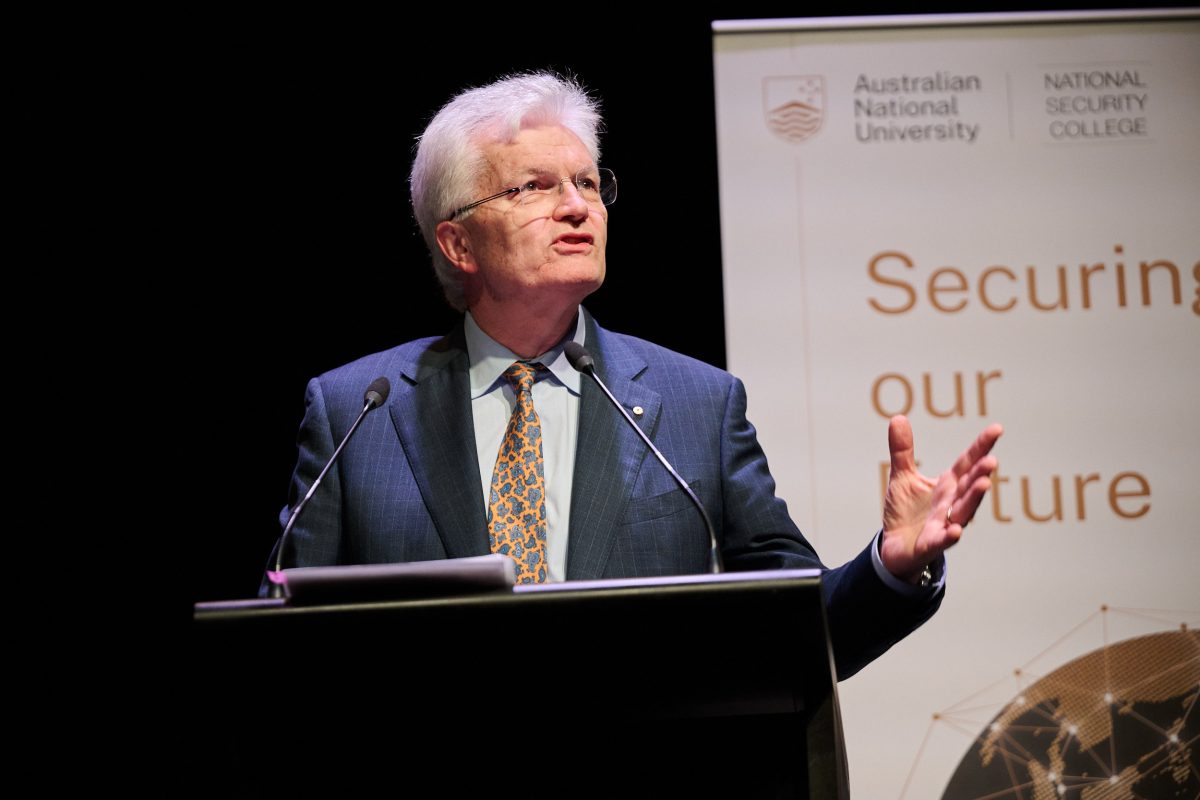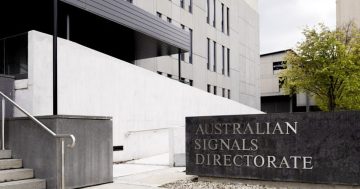
Professor Glyn Davis: “We need constant conversation about the role of the national security community … as new technologies and new threats emerge.” Photo: National Security College.
Australia’s most senior public servant, Secretary of the Department of Prime Minister and Cabinet Glyn Davis, has delivered a sobering speech on cybersecurity and the effects of breaches on national security.
Speaking at the ANU National Security College’s Securing Our Future conference, Professor Davis said the skills and smarts of those trying to undermine Australia’s democracy through sophisticated cyber-attacks are constantly improving, requiring a constantly changing approach from government agencies.
Professor Davis opened his speech by referencing the 1983 Royal Commission conducted by Justice Robert Hope, which focused on the performance and accountability of Australia’s intelligence agencies.
At the heart of that, and a previous inquiry on the matter he had led a decade earlier, was on the question of how Australia safeguards national security without undermining the way of life we are trying to protect.
While there has been a “commensurate increase” in the tools and resources intelligence and security agencies can deploy since the Hope reviews, the same is true for those with malicious intent.
“There is a continuous rebalancing – as the scale and sophistication of threats evolve, so we must develop an equally sophisticated response,” Professor Davis.
The following is an edited extract of the Secretary’s speech that centres on threats to the public sector and how it is responding:
“Today, everywhere in the world is a mouse-click away. Even thinly resourced entities, innocent and otherwise, can organise and operate transnationally.
“Australian-based individuals and groups can readily connect with like-minded counterparts overseas, sharing information and ideas. This has been a boon for business, research, cultural activities and so many other aspects of modern life.
“But, unfortunately, the same accessibility is available for anyone with ill-intent.
“That can mean criminal gangs, terrorist groups, and foreign states with a malevolent purpose.
“There are so many opportunities, so many potential avenues. So Australia’s national security community has adapted.
“For example, every day the Australian Signals Directorate, or ASD, collects and analyses enormous volumes of foreign digital communications … disrupts cyber-enabled crime … and leads the government’s response to the growing number of serious cyber incidents.
“In this highly interconnected age, the task is not just protecting our information from hackers.
“It is also about the integrity and availability of the data and systems we depend on in our everyday lives — from internet and mobile communications to healthcare and our electricity and water distribution. As we see from current conflicts, all become targets.
“ASD is the core of a significant expansion of the nation’s cyber capabilities.
“Through REDSPICE, which will expand the range and sophistication of ASD’s intelligence, offensive and defensive cyber capabilities, ASD will recruit an extra 1900 officers over the next decade.
“It is part of the National Intelligence Community that collectively employs in the order of 9000 people and brings together 10 agencies to protect and enhance Australia’s security, prosperity and sovereignty.
“But the security effort extends beyond those agencies immediately identified with the national intelligence community.
“Departments and agencies — including Defence, Home Affairs, the Australian Federal Police, Foreign Affairs and Trade, Prime Minister and Cabinet, Attorney-General’s and Treasury — all host significant national security functions.
“These include broader policy, regulatory and enforcement responsibilities.
“Many areas of domestic policy, once at arms’ length from national security, today have a national security overlay. Think about the Australian Electoral Commission, the Bureau of Meteorology, the Reserve Bank, Medicare, Centrelink.
“All of these institutions — and others like them — are sources of national strength. But they are also potentially vulnerable …
“This increasingly challenging strategic environment creates some thorny questions for legislators.
“Since the year 2000, at least 124 Acts related to national security have been passed in Australia
“At last count, there were around 3000 pages of relevant legislation and 800 secrecy provisions.
“And every time an Act of this nature is proposed, our lawmakers are presented with the same challenge: strengthening national security while remaining true to our democratic values of openness, transparency, integrity, tolerance, human rights and the rule of law.
“Inescapably, there is an inherent tension between protecting and promoting the rights of the individual and the collective interest of national security and public safety.
“It will always be a balancing act — not easily achieved, often contested, and hopefully always open to public debate …
“Australia is highly regarded internationally for the integrity of our elections. The Australian Electoral Commission is regularly called upon by international partners for advice and expertise on how to conduct reliable and robust elections.
“To help ensure the fairness of our elections, there is a blackout on election ads on television and radio for the final three days of the campaign period, including polling day.
“But the impact of the ban — which only applies to broadcasters — has been diluted by the internet.
“While the clamour of political ads on TV and radio falls silent in the final days of campaigning, online it is a different story. There, the messaging never stops.
“While the law requires that groups or individuals must put their name to internet advertising, that’s about the extent of the regulation.
“Currently, there is little to prevent even the most misleading and outlandish claims being made.
“That may change. The Electoral Matters Committee of Parliament has pointed to truth in political advertising laws. But messages do not have to be overtly party-political to potentially sway opinion.
“The spread of election-related misinformation and broad disinformation online — much of it originating beyond our national borders — is worrying.
“While misleading political statements are nothing new, in recent years there have been increasing attempts to undermine confidence in the election system itself, such as claims unvaccinated voters wouldn’t be allowed into polling places, or ballots marked with pencils may be open to tampering.
“A taskforce that brings together the Australian Electoral Commission and intelligence agencies is helping mitigate the risk. ASIO has, and will continue, to disrupt attempted foreign interference in elections.
“But the proliferation of false and misleading messages online has called the effectiveness of the technology industry’s voluntary code of conduct into doubt.
“Ministers have called for social media platforms to be more committed and active in policing what appears online without compromising freedom of expression.
“It is a difficult tightrope to walk, a high wire act between the values of a democracy and threats to those same liberties.”
It is a compelling speech and one worth reading in full.




















